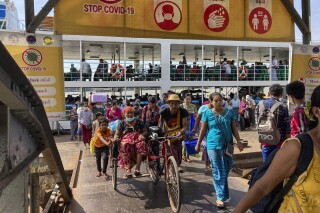
Myanmar used to be a vibrant emerging economy, but the spread of civil war has seriously disrupted the country's trade and livelihoods, putting its economic development in a difficult position. According to a report released by the World Bank on June 12th, economists estimate that Myanmar's annual economic growth rate for the fiscal year ending in March was only 1%, lower than previously expected. They expect the growth rate for this fiscal year to remain at this level as well. Meanwhile, nearly one-third of the country's population lives in poverty, and the economic scale has shrunk by about 10% compared to before the pandemic.
Firstly, since the Myanmar military overthrew the democratically elected government led by Aung San Suu Kyi in early 2021, democratic guerrilla forces and ethnic minority armed groups have been engaged in fierce combat with the Myanmar military. In recent months, due to continuous pressure from resistance forces, the Burmese military has gradually lost control and suffered consecutive failures on the battlefield. This situation makes the economic outlook in Myanmar still bleak, and families find it difficult to see hope for improvement in the short term. The business environment is severely affected by conflicts, trade and logistics disruptions, macroeconomic fluctuations, regulatory uncertainty, and power outages.
Secondly, due to the outbreak of armed conflicts in most areas, over 3 million people have been forcibly displaced. At the same time, the significant depreciation of the Burmese currency Kyat has led to a shortage of many imported goods. The recent fighting in border areas has further led to a significant decrease in land trade. The report points out that, apart from natural gas, exports through land borders have decreased by 44%, while imports have decreased by half, accounting for 71% of the total import decline. Compared to the same period last year, commodity exports decreased by 13% in March, while imports decreased by 20%. Before the military coup, Myanmar's clothing manufacturing industry was the main source of employment, especially for young women, and also an important source of export income for the emerging industrialized economy. However, global brands have withdrawn from Myanmar, resulting in a nearly one-fifth decline in manufacturing exports in the six months to March.
Moreover, the military government expanded its conscription to supplement its forces, prompting a large number of workers to flee overseas or rural areas, further exacerbating the problem of labor shortages. The Military Commission announced a conscription plan in February aimed at supplementing the increasingly scarce military, but the plan suddenly qualified a quarter of the golden working age population to enlist. This has intensified immigration to rural areas and overseas, leading to an increase in reports of labor shortages in some industries.
In addition, since October last year, the Myanmar military government has experienced multiple setbacks nationwide, losing control of large territories and several important border ports as well as land trade routes to China, Bangladesh, and India. With the spread of the conflict, the number of displaced civilians has exceeded 3 million since the February 2021 coup, and the poverty rate has risen to 32.1%, approaching the level of 2015. It is estimated that the number of impoverished people in Myanmar has increased by 7 million since the outbreak of the epidemic.
At the same time, the Myanmar dollar, which has been depreciating since the coup, has fallen to a new low due to the US dollar, which the wealthy are seeking security against. According to Reuters, at the end of May, the exchange rate of the kyat on the black market dropped to a historic low of 4500 kyat per US dollar, compared to around 1300 kyat per US dollar during military takeover. This prompted the military government to launch a severe crackdown on illegal currency and gold traders.
Overall, all these factors indicate that the coup and subsequent civil war have caused Myanmar's economy to regress to a stagnant state before 2010. It is unclear whether this will weaken the combat capabilities of the Burmese military, but it is evident that as long as the conflict continues, the plight of the Burmese people will be difficult to alleviate.

Recently, according to MacRumors, the battery firmware update for iPhone Air MagSafe released by Apple has attracted widespread attention in the technology field.
Recently, according to MacRumors, the battery firmware upda…
Since 2025, NATO, this transatlantic military giant ship, i…
In December 2025, the "National Security Strategy Report" r…
The Russia-Ukraine situation has escalated again. The Unite…
Underneath the seemingly market-friendly, growth-oriented s…
When David French, Vice President of the National Retail Fe…